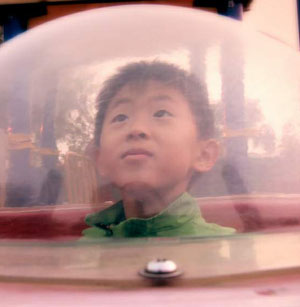Society
Neither 'retarded' nor 'freaks', just different
Updated: 2011-04-14 07:57
By Sun Li (China Daily)
Before making his documentary, Taiwan filmmaker Shen Ko-shang believed autistic people were all like Dustin Hoffman's character in the 1988 Oscar-winning film Rain Man: blabbering, frightened and gifted.
"I was seriously wrong," says Shen, whose four-episode documentary, Children from the Distant Planet, is aimed at raising awareness of this developmental disorder.
Started in 2008, it took Shen two years to complete.
"Clearly, not every person with autism is a highly intelligent chatterbox. Instead, autistic savants of the kind depicted in Rain Man are extremely rare," he says.
While the series is unflinching in showing how people with autism are ostracized and described as "emotionless and retarded", it also lauds the efforts of those trying to present a more accurate picture.
 |
|
A scene from Taiwan filmmaker Shen Ko-shang's |
One episode centers on Eric Chen, a Singapore-based autistic man who reaches out to others and promotes awareness by publishing books, writing blogs and giving talks.
"Autism reflects not an inability to perceive the world, but a sensitivity to it," Shen says. "It is unfair to use words like 'senseless' or 'freak' to label autistic people and say they shut themselves out.
"Many autistic men, besides Chen, shared their feelings with me during the shooting," he says, adding that their repetitive gestures - a common feature of autism - are a way of soothing over-stimulated nerves.
"When they were happy, they would say 'hi' to me and even give me a hug."
Another gut-wrenching episode of the series shows how Tsai Chieh, an autistic boy with impaired social skills, underwent his father's "extreme measures" to bring him back to "normalcy".
The father covered every inch of the walls of Tsai's room with pictures showing different facial expressions and phrases to express their various moods, and forced Tsai to learn them by rote.
"The father assumed that if only his son committed all this to memory it would become a habit with him and facilitate appropriate social interactions," Shen says.
Of course, all the father got was his heartbroken son's tears. Equally heartbroken, he eventually gave up and accepted his son.
"I want people to understand that autism cannot be overcome by pushing those who suffer from the disorder," Shen says. "What we have to do is follow their rhythm."
A veteran documentarian, Shen won the Golden Bell award for Best Director in the non-drama category in 2005. But the director admits making a film on autism was not easy.
"Interviewing autistic people calls for enormous patience. You have to spend months living with them to earn their trust," Shen says. "When disruptive behaviors kick in, you have to stop and wait."
But it was all worth it, he says.
"The filming itself was a great learning process. I now know what can make autistic people jittery," Shen says. "I'm happy that my film will help more people understand this condition."
Narrated by mainland actress Zhou Xun and actor Chen Kun, the documentary will be screened for free in colleges around the country.
Specials

In the swim
Out of every 10 swimsuits in the world, seven are made in China.

Big spenders
Travelers spend more on shopping than food, hotels, other expenses

Rise in super rich
Rising property prices and a fast-growing economy have been the key drivers.